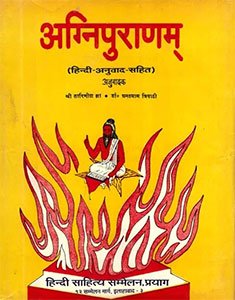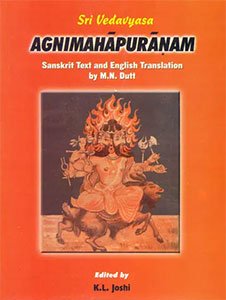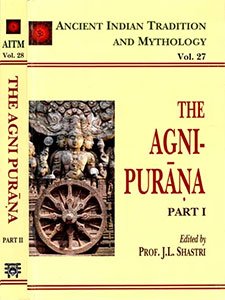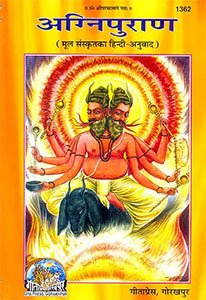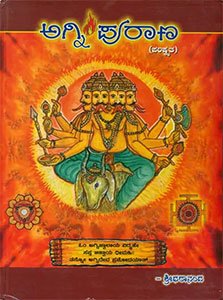Agni Purana [sanskrit]
97,288 words
This Sanskrit edition of the Agnipurana. It is one of the traditional eighteen Mahapuranas presented as an encyclopedia of ancient Indian history and knowledge. It contains either 382 or 383 chapters and over 10.000 verses (Sanskrit Shlokas).
Verse 91.17
रवीशदेवीविष्णूनां खब्धिदेवेन्द्रवर्त्तनात् ।
शतत्रयं षष्ट्यधिकं प्रत्येकं मण्डलं क्रमात् ।
अभिषिक्तो जपेद् ध्यायेच्छिष्यादीन् दीक्षयेद्गुरुः ॥ १७ ॥
ravīśadevīviṣṇūnāṃ khabdhidevendravarttanāt |
śatatrayaṃ ṣaṣṭyadhikaṃ pratyekaṃ maṇḍalaṃ kramāt |
abhiṣikto japed dhyāyecchiṣyādīn dīkṣayedguruḥ || 17 ||
The Sanskrit text of Verse 91.17 is contained in the book The Agni Puranam (Anandashram Edition) by Shri Chimna Apate (श्री चिमणा आपटे). This book is available online or you could buy the latest edition:
Read online Buy now! The Sanskrit text by Shri Chimna Apate (श्री चिमणा आपटे) (1987)
Glossary of Sanskrit terms
Note: This extracts Sanskrit terms and links to English definitions from the glossary, based on an experimental segmentation of verse (91.17). Some terms could be superfluous while some might not be mentioned. Click on the word to show English definitions.
Ravi, Ravin, Shada, Vishnu, Shatatraya, Shashtyadhika, Pratyeka, Mandala, Kramat, Krama, Abhishikta, Shishya, Guru,
Analysis of Sanskrit grammar
Note: this is an experimental feature and only shows the first possible analysis of the Sanskrit text (Verse 91.17). If the system was successful in segmenting the sentence, you will see of which words it is made up of, generally consisting of Nouns, Pronouns, Verbs, Participles and Indeclinables. Click on the link to show all possible derivations of the word.
- Line 1: “ravīśadevīviṣṇūnāṃ khabdhidevendravarttanāt ”
- ravī -
-
ravi (noun, masculine)[nominative dual], [vocative dual], [accusative dual]ravin (noun, masculine)[nominative single]
- śade -
-
śada (noun, masculine)[locative single]√śad (verb class 6)[present middle first single]
- vī -
-
vī (noun, feminine)[compound]vī (noun, masculine)[compound]vi (noun, masculine)[nominative dual], [vocative dual], [accusative dual]
- viṣṇūnām -
-
viṣṇu (noun, feminine)[genitive plural]viṣṇu (noun, masculine)[genitive plural]
- Cannot analyse khabdhidevendravarttanāt
- Line 2: “śatatrayaṃ ṣaṣṭyadhikaṃ pratyekaṃ maṇḍalaṃ kramāt ”
- śatatrayam -
-
śatatraya (noun, neuter)[adverb], [nominative single], [accusative single]
- ṣaṣṭyadhikam -
-
ṣaṣṭyadhika (noun, masculine)[adverb], [accusative single]ṣaṣṭyadhika (noun, neuter)[adverb], [nominative single], [accusative single]ṣaṣṭyadhikā (noun, feminine)[adverb]
- pratyekam -
-
pratyeka (noun, masculine)[adverb], [accusative single]pratyeka (noun, neuter)[adverb], [nominative single], [accusative single]pratyekā (noun, feminine)[adverb]
- maṇḍalam -
-
maṇḍala (noun, masculine)[adverb], [accusative single]maṇḍala (noun, neuter)[adverb], [nominative single], [accusative single]maṇḍalā (noun, feminine)[adverb]
- kramāt -
-
kramāt (indeclinable)[indeclinable]krama (noun, masculine)[adverb], [ablative single]
- Line 3: “abhiṣikto japed dhyāyecchiṣyādīn dīkṣayedguruḥ ”
- abhiṣikto* -
-
abhiṣikta (noun, masculine)[nominative single]
- japed -
-
√jap (verb class 1)[optative active third single]
- dhyāyecch -
-
√dhyā (verb class 1)[optative active third single]
- śiṣyād -
-
śiṣya (noun, masculine)[adverb], [ablative single]śiṣya (noun, neuter)[adverb], [ablative single]√śās -> śiṣya (participle, masculine)[ablative single from √śās class 2 verb]√śās -> śiṣya (participle, neuter)[ablative single from √śās class 2 verb]√śiṣ -> śiṣya (participle, masculine)[ablative single from √śiṣ class 10 verb]√śiṣ -> śiṣya (participle, neuter)[ablative single from √śiṣ class 10 verb]√śās (verb class 2)[optative active third single], [benedictive active third single]
- īn -
-
i (noun, masculine)[accusative plural]
- dīkṣayed -
-
√dīkṣ (verb class 0)[optative active third single]
- guruḥ -
-
guru (noun, masculine)[nominative single]
Other editions:
Also see the following editions of the Sanskrit text or (alternative) English translations of the Verse 91.17
Agni Purana with Hindi Translation
by Tarinish Jha and Dr. Ghanshayam Tripathi (तारिणीश् झा और डॉ. घनश्याम त्रिपाठी) (2007)
Publisher: Hindi Sahitya Sammelan, Allahabad; 1199 pages; Title: अग्निपुराणम् (संस्कृत एवं हिन्दी अनुवाद);
Buy now!
Agni Purana (Two Volumes)
by M. N. Dutt (2023)
Publisher: Parimal Publication Pvt. Ltd.; Editor: K. L. Joshi.; ISBN-10: 8171101690; ISBN-13: 9788171101696; 1070 pages.
Buy now!
Agni-Purana (Set of 4 Volumes)
by N. Gangadharan (2006)
Publisher: Motilal Banarsidass Publishers Pvt. Ltd.; ISBN: Part I 8120803590 (9788120803596); Part II 8120803604 (9788120803602); Part III 8120801741 (9788120801745); Part IV 812080306X (9788120803060); 1271 pages.
Buy now!
The Agni Purana (Hindi)
by (2013)
Publisher: Gita Press, Gorakhpur; Title: अग्निपुराण (केवल हिन्दी अनुवाद); ISBN-10: 8129302934; ISBN-13: 9788129302939; 848 pages.
Buy now!
Agni Purana (Kannada)
by Sreedharananda (2013)
Publisher: Pooja Pusthaka Bhandara, Bangalore; Title: ಅಗ್ನಿ ಪುರಾಣ; 560 pages.
Buy now!Preview of verse 91.17 in Kannada sript:
ರವೀಶದೇವೀವಿಷ್ಣೂನಾಂ ಖಬ್ಧಿದೇವೇನ್ದ್ರವರ್ತ್ತನಾತ್ ।
ಶತತ್ರಯಂ ಷಷ್ಟ್ಯಧಿಕಂ ಪ್ರತ್ಯೇಕಂ ಮಣ್ಡಲಂ ಕ್ರಮಾತ್ ।
ಅಭಿಷಿಕ್ತೋ ಜಪೇದ್ ಧ್ಯಾಯೇಚ್ಛಿಷ್ಯಾದೀನ್ ದೀಕ್ಷಯೇದ್ಗುರುಃ ॥ ೧೭ ॥
![Agni Purana [sanskrit] - book cover](/uploads/a/Agni-Purana-Sanskrit.jpg)
